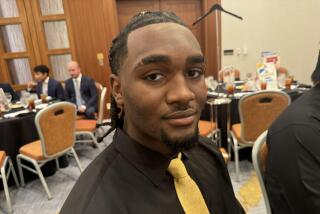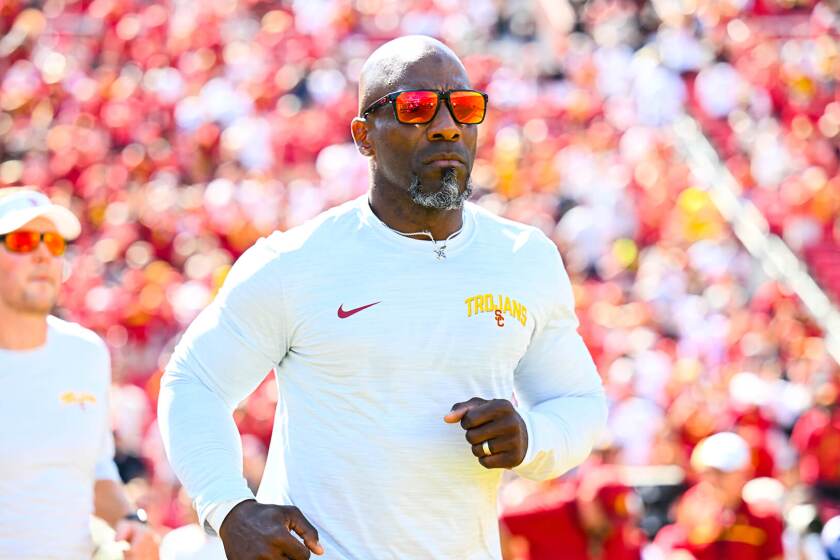Back From The Brink
- Share via
SACRAMENTO — A sweet, warm smell drifts from another part of the house, must be the kitchen, and Antuan Simmons perks up.
“What’ve you got cooking in there?” he asks.
His mother frowns. “Nothing.”
That look doesn’t fool him. He frowns right back and they laugh.
Lasagna. Baked fish. Chicken and rice.
Simmons is eating three meals a day, making up for the months he spent in a hospital bed this summer, his body withering away. He is beginning to resemble the young man in the photographs all around his living room, pictures of him as a tough, fast cornerback at USC.
The surgeries and complications have left him too weak to play in what was supposed to be his best season. All those football magazines his mother, Faye, keeps on the coffee table predict he would have been an All-American and a top-10 pick in the NFL draft.
That doesn’t matter.
Simmons drinks purple Gatorade on ice and teases his mom about her cooking because they know it is only by the grace of God that he is alive.
They know that if he had not suffered a back injury last season, had not given in to the pain and sought help, the doctors might not have seen those blotches on his X-ray.
*
At first, Simmons ignored the injury because he wanted to play against UCLA. But the week before, after a tough game at Washington State, he could not sleep and was rushed into surgery to relieve pressure on a nerve.
It was after the operation, during a follow-up examination, that doctors spotted tumors in his abdomen.
“I didn’t feel sick,” Simmons recalled. “So I wasn’t really stressed at all.”
He had no inkling of what was to come.
The masses had formed along his aorta and wrapped around his left kidney. There was good news: The tumors were detected before they could turn malignant. There was bad news too.
“They were located in a very difficult place,” said Dr. Donald Skinner, head of surgery at the USC/Norris Comprehensive Cancer Center and Hospital. “To remove these things created a real technical problem.”
The initial surgery, in mid-May, took six hours as Skinner cut out the tumors and reconstructed a major vein. Then Simmons developed internal bleeding and needed a second operation.
“That’s when it became a nightmare,” Simmons said. “I never knew I could feel like that.”
A five-day hospital stay stretched on for weeks as doctors struggled to control the bleeding. Simmons was in and out of intensive care, too weak to stand without help. He was fed by intravenous tubes, but his muscles atrophied and his face looked skeletal.
Through it all, there was disbelief. Simmons had always considered himself indestructible. His mother could not have imagined her son would drift away so quickly.
Faye Simmons is a striking woman, her love fierce. Each day she sat by his bed, telling jokes and talking about happier times. Then, she said, “I’d find a little corner to pray and cry.”
At one point her son’s weight dropped by 35 pounds and he was put on a respirator. His girlfriend, Stacie Crump, recalls that his eyes grew distant.
“You read about this happening to other people,” she said. “It happens to your neighbor, not you.”
About that time, the news carried reports that Eric Turner, the late Oakland Raider safety, was dying of complications from abdominal cancer.
*
When Simmons arrived at USC in 1997, he studied the veterans in training camp. It became evident there were two kinds of players.
“You can be the kind who gets run over,” he said. “Or you can be strong.”
At 5 feet 10 and 190 pounds, Simmons was strong enough to stop the run, quick enough for single coverage. The coaches pushed him into the starting lineup in the second game of the season against Washington State, and he responded with 11 tackles.
“Didn’t blink once,” Dennis Thurman, the secondary coach, said. “Just kept going.”
Over three seasons, until his back injury, Simmons appeared in every game for the Trojans. There were rough stretches, particularly last season, when mental lapses undermined his grit and physical talent. Sometimes Thurman rode him about practicing harder.
But there were also stretches of dazzling play.
As a sophomore, Simmons intercepted two fourth-quarter passes against Washington and returned both for touchdowns. Last October, against Stanford, he intercepted two passes and recovered a fumble.
In three seasons on special teams, he blocked four field-goal attempts, a conversion attempt and a punt. He became the sort of veteran that other players looked up to.
“If I had questions about how to cover a guy or something I should be doing better, he was there to tell me,” cornerback Kris Richard said. “He was there to lean on.”
No one was surprised when the preseason magazines mentioned Simmons as a team leader and a potential top-10 pick in the NFL draft next spring.
“One of the true warriors on our football team,” Coach Paul Hackett said. “I mean, blocking kicks, making touchdowns, intercepting balls, playing the tough bump-and-run.
“This is the guy who got such a tough break.”
*
Even at his worst, as he lay struggling for breath, Simmons says he never felt scared. He simply watched the clock on the wall and waited for the day when he would feel better.
“There were times when he had tubes everywhere,” Thurman said. “Yet the eyes were always open and he always shook your hand.”
The assistant coach came by every day. Richard and defensive tackle Ennis Davis were frequent visitors too. Hackett stopped in and talked to Simmons about redshirting his senior season.
“I told him he’d have to put up with me for another year,” Hackett said. “He just grinned.”
Privately, though, coaches and teammates worried that Simmons would not make it. “If it’s you or me . . . we’re dead,” Hackett said.
The turning point came in late June when doctors discovered the reason for Simmons’ labored breaths: More than a liter of fluid had developed around his heart.
This time, Simmons was too ill and sedated to realize he’d been through a procedure to drain the fluid. But when he awoke, he felt a change. Each day thereafter, he grew stronger.
Almost two months had passed since he was admitted to the hospital.
“I’d been there so long I was almost scared to leave,” he said. “I didn’t know if I was ready.”
His mother took him back to Sacramento, to a tract house south of downtown, in a neighborhood where people spend their weekend afternoons washing cars and watering lawns that have turned brown around the edges.
“His mom was taking care of everything,” Crump said. “She was taking him home to fatten him up.”
*
There are plenty of lessons to be learned from a life-threatening illness.
“People often come out with a stronger mental attitude,” Skinner, the surgeon, said. “It gives them something extra.”
Simmons pledges to spend more time with his 5-year-old daughter. He says he will study harder and be more serious about football--the game he sometimes took for granted.
Later this month he will rejoin the team in camp at UC Irvine. At Skinner’s urging, the trainers will start him running and lifting weights, rebuilding his body for next season.
“I know it’s going to be hard,” Simmons said. “When I come back I’ll be nervous because everybody will be looking at me, wanting to see how I am.”
There will be more blood tests and perhaps a minor hernia procedure. But all of that can wait a few weeks.
For now, Simmons spends his days with friends or watching television at a cousin’s house. He weighs 170 pounds, 20 fewer than when he entered the hospital, but his arms and legs aren’t so skinny and his face has filled in, framed by a closely trimmed beard and a diamond stud in each ear.
“When I got home, I didn’t want to be seen,” he said. “My family and friends came around and it lifted my spirits.”
The illness could have left him depressed, thinking about what might have been. Instead, he takes daily walks through a nearby park and sometimes chases his dog around the yard.
The rest of the time he relaxes on the couch or plays a football video game, waiting for his mother to pull the next meal from the oven.
Lasagna. Baked fish. Chicken and rice.
“Yeah,” he said, teasing, “I guess my mom can cook a little bit.”
For now, that is reason enough to be happy.
More to Read
Go beyond the scoreboard
Get the latest on L.A.'s teams in the daily Sports Report newsletter.
You may occasionally receive promotional content from the Los Angeles Times.






